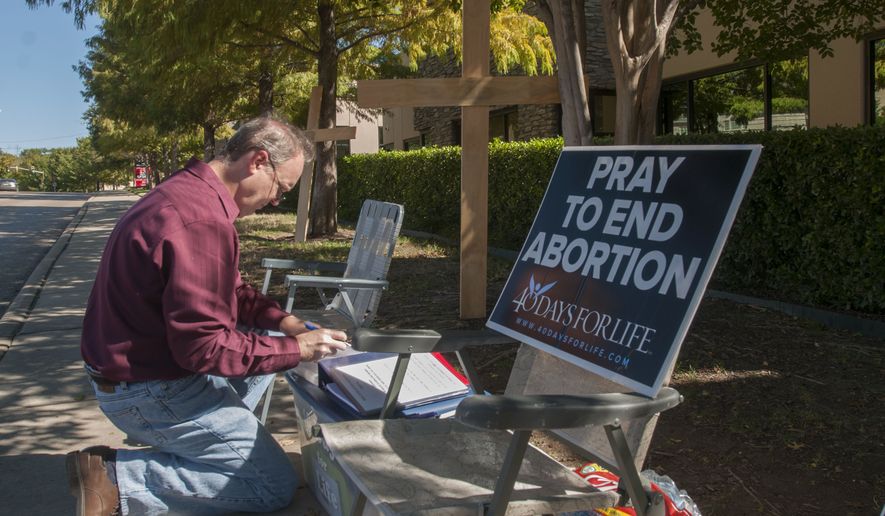In a pair of closely watched abortion cases, the Supreme Court on Monday received an appeal to block key provisions of a new Texas law restricting abortions, while the justices declined without comment to hear an Oklahoma case seeking to revive restrictions on abortion-inducing drugs.
Planned Parenthood and other abortion providers in Texas asked the high court to put an emergency hold on a new state law that requires abortionists to have local hospital-admitting privileges.
A district judge in Texas struck down the provision, but a panel of judges with the 5th U.S. Circuit Court of Appeals said the law could go into effect during appeal because the state was likely to prevail.
The Supreme Court should put a stay on the hospital admitting-privilege law because it is reducing women’s abilities to get a legal abortion, Planned Parenthood of Greater Texas Surgical Health Services and its co-plaintiffs said in their request to Supreme Court Justice Antonin Scalia.
“Already, appointments are being cancelled and women seeking abortions are being turned away,” they wrote.
Justice Scalia, the member of the court who receives all such requests from Texas, has asked state officials to respond by Nov. 12.
Recently, as many as 12 abortion clinics in Texas decided to close as the bulk of Texas’ House Bill 2 went into effect. A key measure — currently unchallenged in court — disallows abortions after 20 weeks gestation because of the legislature’s finding that a fetus can feel pain at that stage.
The hospital-admitting-privilege law, however, is a core issue.
State officials say requiring abortionists to have admitting privileges at a hospital within 30 miles of where the abortion is performed is needed to protect women’s safety and health. In addition to Texas, some 16 other states have hospital admitting-privilege laws, Texas Right to Life said.
Elizabeth Graham, the group’s director, praised the law as a “historic moment in the pro-life movement.” The abortion industry and Planned Parenthood “are so desperate to protect their financial interests that they continue to resist and oppose safety standards in their abortion mills,” she said.
Pro-choice groups counter that such privileges are hard to get for out-of-area abortionists, and unnecessary, because in the event of an emergency at a clinic, the patient can be admitted into a local hospital emergency room.
“The immediate impact will be felt by low-income women who will not only lose services to abortion but also to birth control, STI testing, and cancer screening as these clinics close,” said Eleanor Smeal, president of the Feminist Majority Foundation.
Separately Monday, the Supreme Court dismissed a case seeking to revive an Oklahoma law overseeing the way abortion-inducing drugs were dispensed.
The Oklahoma Supreme Court struck down the 2011 law, saying it illegally obstructed women’s right to early abortions.
In June, the Supreme Court raised hopes that it would tackle the issue of “medication abortion” when it tentatively accepted Cline v. Oklahoma Coalition for Reproductive Justice.
At issue was an Oklahoma law requiring that abortion providers follow Food and Drug Administration (FDA) rules on mifepristone, also known as RU-486, and other abortion-inducing drugs.
Abortionists now use an updated process that requires fewer visits to a doctor, requires smaller doses of drugs, and lets women have abortions using medications, rather than surgery, until 63 days after their last menstrual period; FDA protocol sets the limit at 49 days.
When the high court took the case, it also asked the Oklahoma Supreme Court to opine on whether the contested law also prohibited use of labor-inducing misoprostol in conjunction with mifepristone, and use of methotrexate to terminate early ectopic pregnancies.
On Oct. 29, the Oklahoma court replied that, in its view, the law disallowed use of both those drugs because they were being used “off-label” and were not formally approved for obstetric care.
On Monday, the Supreme Court dismissed the Cline case as “improvidently granted.”
The decision means the Oklahoma law will remain struck down. The high court’s dismissal “is a powerful statement of the law’s unconstitutionality,” Martha Skeeters, president of the Oklahoma Coalition for Reproductive Justice, said Monday.
The Texas abortion law, House Bill 2, also has a provision requiring FDA protocol be followed in using abortifacients. However, Planned Parenthood said in its Monday request to the Supreme Court that the Texas medication-abortion provision was “not at issue in this application.”
• Cheryl Wetzstein can be reached at cwetzstein@washingtontimes.com.




Please read our comment policy before commenting.